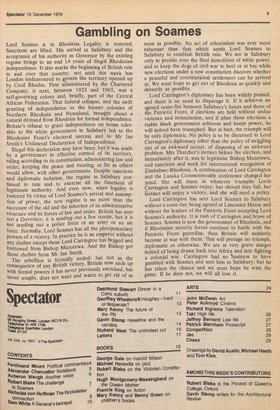Gambling on Soames
Lord Soames is in Rhodesia. Legality is restored. Sanctions are lifted. His arrival in Salisbury and the acceptance of his authority as Governor by the existing regime brings to an end 14 years of illegal Rhodesian independence. It also marks the beginning of British rule in and over that country: not until this week has London endeavoured to govern the territory opened up by Cecil Rhodes. First administered by the Chartered Company, it next, between 1923 and 1965, was a self-governing colony and, briefly, part of the Central African Federation. That federal collapse, and the swift granting of independence to the former colonies of Northern Rhodesia and Nyasaland, brought about a natural demand from Rhodesia for formal independence. Britain's refusal to grant independence on terms tolerable to the white government in Salisbury led to the Rhodesian Front's electoral success and to Mr Ian Smith's Unilateral Declaration of Independence.
Illegal this declaration may have been; but it was made by a government in effective control of its territory, ruling according to its constitution, administering law and order, keeping the peace and treating, as •far as others would allow, with other governments. Despite sanctions and diplomatic isolation, the regime in Salisbury continued to rule and to exercise all the functions of legitimate authority. And even now, when legality is restored by virtue of Lord Soames's arrival and assumption of power, the new regime is no more than the successor of the old and the inheritor of its administrative structure and its forces of law and order. Britain has sent out a Governor; it is sending out a few troops, but it is not sending out a police force or an army or an air force. Formally, Lord Soames has all the plenipotentiary Powers of a viceroy. In practice he is an emperor without any clothes except those Lord Carrington has begged and borrowed from Bishop Muzorewa. And the Bishop got those clothes from Mr Ian Smith. The rebellion is formally ended: but not as the Consequence of any British victory. Britain now ends up with formal powers it has never previously exercised, has never sought, does not want and wants to get rid of as
soon as possible. No act of colonialism was ever more reluctant than that which sends., Lord Soames to Salisbury to establish British rule. We are in Salisbury only to preside over the final demolition of white power, and to keep the dogs of civil war to heel or at bay while new elections under a new constitution discover whether a peaceful and constitutional settlement can be arrived at. We must hope to get out of Rhodesia as quickly and decently as possible.
Lord Carrington's diplomacy has been widely praised, and there is no need to disparage it. If it achieves an agreed cease-fire between Salisbury's forces and those of the Patriotic Front, if elections are held without undue violence and intimidation, and if after those elections a stable black government achieves and keeps power, he will indeed have triumphed. But at best, the triumph will be only diplomatic. No policy is to be discerned in Lord Carrington's diplomacy other than the policy of wriggling out of an awkward corner, of disposing of an awkward problem. Mrs Thatcher's instinct before the election, and immediately after it, was to legitimise Bishop Muzorewa, end sanctions and work for international recognition of Zimbabwe-Rhodesia. A combination of Lord Carrington and the Lusaka Commonwealth conference changed her mind. She will share in whatever triumphs Lords Carrington and Soames enjoy; but should they fail, her instinct will enjoy a victory, and she will need a policy.
Lord Carrington has sent Lord Soames to Salisbury without a cease-fire being agreed at Lancaster House and without the leaders of the Patriotic Front accepting Lord Soames's authority. It is rash of Carrington and brave of Soames. Soames is now the government of Rhodesia, and if Rhodesian security forces continue to battle with the Patriotic Front guerrillas, then Britain will suddenly become at war with them. This will presage no triumph, diplomatic or otherwise. We are in very grave danger indeed of being drawn back into Africa and into fighting a colonial war. Carrington had no 'business to have gambled with Soames and sent him to Salisbury; but he has taken the chance and we must hope he wins the game. If he does not, we will all lose it.


































 Previous page
Previous page